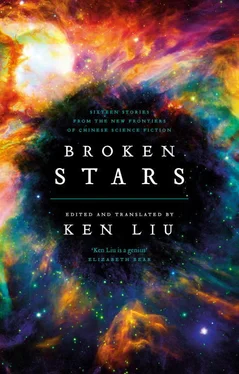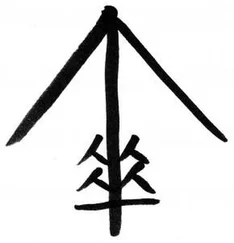However, the life of middle school students was very different. The costume drama Princess Pearl was really popular, and they showed it all the time on TV. Everyone in my class became addicted, and all we could talk about was the fate of Princess Xiaoyanzi. We didn’t understand politics and paid very little attention to those world events.
Gradually, though, the effects of the worldwide depression became apparent in daily life. Real estate prices kept crashing; Heizi’s father lost money in his property deals and turned to day-trading stocks, but he was still losing money. Although prices for everything were falling, wages dropped even faster. Since no one was buying the high-tech gadgets, they stopped making them. The huge LCD screen in Heizi’s home broke, but they couldn’t find anything similar in the market and had to make do with a clumsy CRT monitor: the screen was tiny and convex, which just looked weird. My father’s notebook computer was gone, replaced by a big tower that had much worse specs—supposedly this was all due to the depressed American economy. Over time, websites failed one after another, and the new computer games were so bad that it was no longer fun to mess around on the computer. Street arcades became popular, and kids our age went to hang out at those places while the adults began to practice traditional Chinese meditation.
There was one benefit to all this “progress”: the sky over Beijing became clear and blue. I remembered that, when I was little, every day was filled with smog and it was difficult to breathe. Now, however, other than during sandstorm season, you could see blue sky and white clouds all the time.
In the summer of my second year in middle school, Qiqi returned to Beijing for a visit and stayed with my family. She was tall and slender, almost 5′3″, and wore a pair of glasses. With her graceful manners and big eyes, she was closer to a young woman than a girl, and I still thought she was pretty. When she saw me, she smiled shyly, and instead of calling me “Bao gege ” like a kid, she addressed me by my given name: “Baosheng.” She had lost all traces of her Beijing accent and spoke in the gentle tones of southern China, which I found pleasing. I tried to reminisce with her about the Olympics and watching Pleasant Goat and Big Big Wolf . Disappointingly, she told me she couldn’t remember much.
I overheard Mom and Dad saying that Qiqi’s parents were in the middle of a bitter divorce and were fighting over every bit of property and Qiqi’s custody. They had sent Qiqi away to Beijing to avoid hurting her while they tore into each other. I could tell that Qiqi was unhappy, because I heard her cry in her room the night she arrived. I didn’t know how to help her except to take her around to eat good food and see interesting sights, and to distract her with silly stories. Although Qiqi had been born in Beijing, she was so young when she left that she might as well have been a first-time visitor. That whole summer, she rode behind me on my bicycle, and we toured every major avenue and narrow hutong in the city.
We grew close again, but it wasn’t the same as our childhood friendship; rather, our budding adolescence colored everything. It wasn’t love, of course, but it was more than just friendship. Qiqi got to know my good friends, too. Heizi, in particular, came over to my home much more frequently now that a young woman was living there. One time, Heizi and I took Qiqi to hike the Fragrant Hills. Heizi paid a lot of attention to Qiqi: helping her up and down the rocky steps and telling her jokes. While Qiqi and Heizi chatted happily, I felt annoyed. That was when I first noticed I didn’t like others intruding between Qiqi and me, not even Heizi.
Near the end of summer break, Qiqi had to go back to Shanghai. Since neither of my parents was free that day, I took her to the train station. The two of us squeezed onto the train half an hour before departure time, and I made up my mind and took from my backpack a gift-wrapped parcel I had prepared ahead of time.
Hesitantly, I said, “Um, this… is a… present for… for you.”
Qiqi was surprised. “What is it?”
“Um… why don’t you… open it… um… later? No!—”
But it was too late. Qiqi had torn open the package and was staring wide-eyed at the copy of High-Difficulty Mathematical Questions from the High School Entrance Examination with Solutions and Explanations .
“Well, you told me you had trouble with math…” I struggled to explain. “I like this book… I figured… um… you might find it helpful…”
Qiqi was laughing so hard that tears were coming out of her eyes. I felt like the world’s biggest idiot.
“Whoever heard of giving a girl a test-prep manual as a gift?” Still laughing, Qiqi opened the book to the title page. Her face froze as she read the Pushkin poem I had copied out:
Life’s deceit may Fortune’s fawning
Turn to scorn, yet, as you grieve,
Do not anger, but believe
In tomorrow’s merry dawning.
When your heart is rid at last
Of regret, despair, and fear,
In the future, what has passed
Shall in kinder light appear. [6] English translation courtesy of Anatoly Belilovsky, © 2014. Used here with permission.
After the poem, I had written two lines:
To my friend Zhao Qi: May you forget the unhappy parts of life and live each day in joy. Love life and embrace ideals!
I felt very foolish.
Qiqi held the book to her chest and gave me a bright smile, but tears were spilling out of the corners of her eyes.
3.
Qiqi left and my life returned to its familiar routines. But my heart would not calm down.
When Qiqi visited, she brought a book called Season of Bloom, Season of Rain , which was popular among middle school girls back then. She had wrapped the book’s cover carefully in poster paper and written the title on it in her neat, elegant handwriting. Curious, I had flipped through it but didn’t find it interesting. Qiqi left the book behind when she returned to Shanghai, and I hid it in the deepest recess of my desk because I was afraid Mom would take it away. The book still held Qiqi’s scent, and I pulled it out from time to time to read until I finished it. Afterward, I couldn’t help but compare myself and Qiqi to the high school students involved in the novel’s complicated love triangles: Was I more like this guy or that one? Was Qiqi more like this girl or that girl? One time, I brought up the topic with Heizi and he almost died from laughing.
Just because boys weren’t into romance novels didn’t mean we weren’t interested in the mysterious emotions portrayed in them. Anything having to do with love was popular among my classmates: everyone copied love poems, sang romantic ballads, and watched Divine Eagle, Gallant Lovers , imagining we were also star-crossed martial arts heroes and heroines. “Matchmaking” by astrology became a popular game. Once, one of the girls in my class, Shen Qian, and I were assigned classroom cleanup duty together, and somehow that inspired everyone to think of us as a couple. I vociferously denied this, not realizing that this only made the game even more fun for others. I resorted to ignoring Shen Qian altogether, but this only led all our classmates to postulate that we were having a “lovers’ spat.” I didn’t know what to do.
In the end, Shen Qian came to my rescue. She made no secret of her interest in a high school boy known for his wit and generated a ton of juicy gossip—as a result, rumors about Shen Qian and me naturally died out.
Shen Qian’s early attempt at romance soon ended when parents and teachers intervened, alarmed by this distraction from our academic development. Afterward, she acted aloof and cold to all of us, but spent her time reading books that appeared profound and abstruse: contemplative essays about Chinese culture, collected works of obscure philosophy, and the like. Everyone now said that Shen Qian was going to become a famous writer. However, her class compositions often took original and rebellious points of view that led to criticism from the teachers.
Читать дальше












